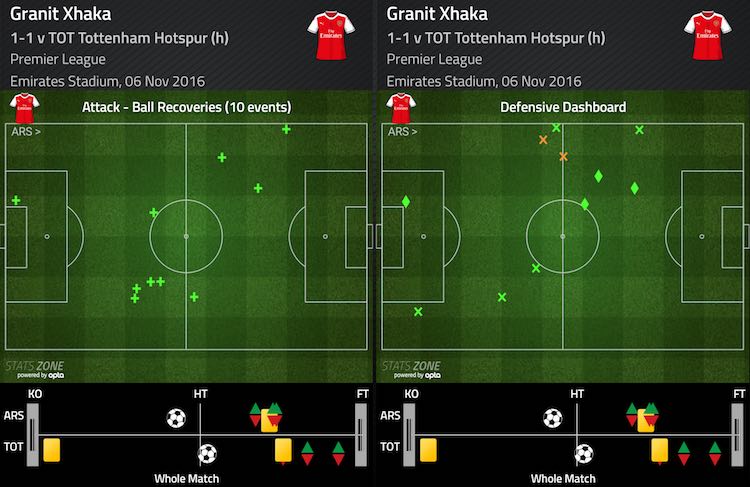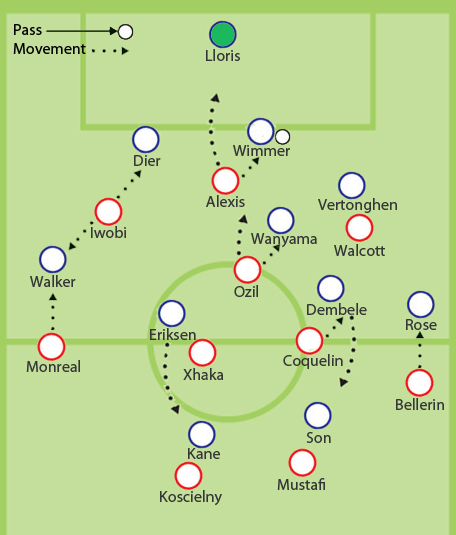A somewhat scrappy and frenetic North London Derby saw both teams happy, in the end, to settle for a 1-1 draw. Arsenal were perhaps the more frustrated side given the absentees for Tottenham Hotspur, and the chances they created in the first-half, but they never really got the measure of a stretched encounter.
In fact, Spurs were the main aggressors, and it can be said that Mauricio Pochettino has a measure of his opposite counter-part, Arsene Wenger, because since 2014-15, his Spurs side have featured in the top-10 four times for the opponents who have restricted Arsenal to their lowest passing accuracy. Here, Arsenal were successful with only 69% of their passes, the second lowest they have accrued in a Premier League match in the last three seasons.
Much of that was down to how Spurs stretched the pitch and made the game an end-to-end encounter, a battle of punch and counter-punch. Though it lacked real technical quality, it was mesmerising game for the speed in which both sides attacked, sensing the moment when the other team was least organised as the opportunity to go for the kill. And that’s perhaps why Wenger was more frustrated of the two managers at the end of the game because Arsenal had the strongest spell in the match, a 15-minute period before half-time where he said, “we looked always like we could score every time we crossed the halfway line.” Every time Spurs attacked, Arsenal won the ball back and broke with speed and should have scored more than the one – an own goal from Kevin Wimmer after a free-kick from Mesut Ozil – with Alex Iwobi and Theo Walcott going the closest.
Before that, Spurs began the brighter, using the full length and width of the pitch to find gaps in which to exploit Arsenal. Pochettino surprisingly chose a 3-4-1-2 formation, and that put Arsenal on the back-foot instantly. He explained his approach: “When you have the full-backs we have: Danny Rose, Kyle Walker, Kieran Trippier or Ben Davies, they can play forward. Like offensive players. Today we tried to put them in a better position, an offensive situation. They didn’t have to think too much about going backwards and tried to play like wing-backs. That was our idea, to play with two strikers and two midfielders, one, Mousa Dembele, more offensive.”
The plan worked for about 20 minutes, culminating in a missed header from Harry Kane. Actually, the attack did well to highlight the approaches of both teams in the early stages because from a throw-in, it showed how Arsenal tried to get tight to the Spurs midfielders, and unsettle them by being aggressive to the ball. Here, however, Francis Coquelin misjudged the intention of his opposite number, Vincent Wanyama, who was then able to let the ball run across him. The subsequent scenario saw the midfield open up and eventually, Christian Eriksen could get on the ball unchallenged to cross to the diving Kane.
At this moment, the main function of Arsenal’s central midfield was to spoil rather than create. Granit Xhaka was the standout player, though Coquelin also performed his duties well. It was a fascinating match-up between technique and muscularity, and though Moussa Dembele received the official man-of-the-match award, Xhaka wouldn’t have been far behind. Indeed, getting the ball to Dembele summed up Spurs’ initial approach, and Arsenal had trouble getting close to him. Xhaka was the best player, and on 23 minutes, would complete already 7 ball recoveries (Coquelin also ended the half with 7).

Arsenal’s approach to press Spurs was essentially to man-mark them. The front three took the three centre-backs, whilst Ozil would closely engage the deepest midfielder, usually Wanyama. The two central midfielders behind would thus alternate between pushing up or dropping deep, depending on who went towards the ball. That job was usually Coquelin’s, who followed Dembele, whilst Xhaka sat back somewhat and picked up the loose balls. The game, therefore, turned into one of 1v1 duals all over the pitch with Spurs doing particularly well to commit runners behind Arsenal’s midfield – whether that was Eriksen or Dembele, or one of Son or Kane moving into the channels. The Gunners would later match that approach, bursting into the spaces that Spurs left behind, but for now, Tottenham had the ascendancy.

Arsenal’s early woes were compounded by an uncoordinated press, uncertain whether to push really high, or hold their positions. Spurs used their goalkeeper well, Hugo Lloris, to get the extra man advantage and then usually play long or push their wing-backs really high up the pitch to force Arsenal’s wingers back. That’s where the hesitancy stemmed from because the front three/four set the tone for the press, but if they didn’t, that allowed easy passes to be played into midfield.
The Gunners perhaps didn’t quite get to grips with the press by the end of the game though they were noticeably more compact in the second-half. However, they were able to alleviate this weakness somewhat by being darn good at one-on-ones and recovery danger with speed. Hector Bellerin and Nacho Monreal in particular had two or three moments in front of goal where they made last ditch blocks to rescue the situation, whilst breaking our of the defensive line was a key feature of Shkodran Mustafi’s play. Eventually, though, it would be their undoing, when Laurent Koscielny dangled a leg to bring down Moussa Dembele for the penalty.
Nevertheless, the approach broadly served them well to compete with Spurs’ muscularity and finesse. Xhaka was the standout, delivering a convincing defensive display. He wasn’t able to stamp his authority going forward; Arsenal lacked coehsion and patience, and their display probably matched the one we saw midweek, against Ludogorets, when they started slowly, got back into the game halfway through the first-half, and then scrapped their way through the second. Unfortunately, there wasn’t the final hurrah that Ozil delivered in that night in Bulgaria. He was the one who drove Arsenal on in the second-half; initially that was Alexis, roaming into wide-left positions and executing key passes (three in the first-half).
Later, the substitutions Wenger made didn’t make any impact. Aaron Ramsey came on for Coquelin to provide more drive and security in possession, but lacked the clarity in thinking that extra minutes surely would provide him. Alex Oxlade-Chamberlain was also underwhelming. He replaced Theo Walcott who faded in the second-half as Jan Vertonghen could play a narrow third centre-back role that nullified his runs. Oxlade-Chamberlain had space on the flanks but his delivery was often frustrating as it was poor.
In the end, the draw was a fair result. The encouraging signs were the speed at which Arsenal attacked on the counter, highlighting the improvement they have made in this area. Alexis’ role in this is important, because the players know he comes alive on the break, and any time he gets the ball, there’s space to run beyond. It might also be the coming of age of Xhaka in an Arsenal shirt; to prove he can match disciplines with his unerring eye for the pass. He certainly passed the test against Spurs.


